Published December 15, 2021
The Need To Act On Climate
By Priscilla De La Cruz
We’re already experiencing the climate crisis. It’s intensifying and accelerating—with increased temperatures, urban heat islands, extreme ocean changes, sea-level rise, and intense rainfall and flooding. We recently saw the remnants of Hurricane Ida cause a road to collapse in Portsmouth.
We see its impacts on birds - especially migratory species - right here in the Ocean State. A rapidly warming climate makes it challenging for migratory birds to adapt to the irreversible altering of habitat, food chains, pollinators and blooming seasons, and species interactions.
But there can be optimism – we know that we can transition away from fossil fuels and invest in climate; there is economic opportunity in facing this crisis and investing in a sustainable and resilient economy. And Audubon is pleased to report that the Rhode Island legislature passed several bills this year, including the landmark 2021 Act On Climate legislation, setting the framework our state needs to respond to the crisis and opportunities it presents. Audubon worked tirelessly with legislators, partner advocates, and Rhode Islanders mobilized for climate action in this multi-year effort.
The recent Intergovernmental Panel on Climate Change (IPCC) report reinforced the need for immediate, sustained large-scale reductions in greenhouse gas emissions to limit the worst impacts. The 2021 Act On Climate requires Rhode Island to reduce its greenhouse gas emissions by 100% by 2050, with mandatory, binding, and enforceable interim targets—45% carbon reductions by 2030 and 80% by 2040—per the latest science to avert climate disaster, while centering environmental justice and labor voices in the planning process.
Massachusetts established similar legislation with binding and enforceable carbon reduction targets through a Global Warming Solutions Act back in 2008. This positioned the Massachusetts economy to support booming industries in energy efficiency, renewable energy, and electric vehicles. Rhode Island can do the same. We have the solutions to position our state as a leader in the clean energy future.
What’s the next step? The state must successfully implement the Act On Climate legislation. Additional proposed legislation must be passed, and the necessary regulations implemented. There is no one solution, and the crisis calls for an all-hands-on deck response.
In June, Audubon joined with several organizations and submitted a letter to Governor McKee and Executive Climate Change Coordinating Council (EC4) members. The authors asked for:
- Justice and equity to be prioritized
- A robust stakeholder process
- The necessary State staff resources to enable success
- A clear timeline to immediately update the 2016 RI GHG Reduction Plan by December 2022—the first milestone requirement of the new climate law.
- The development of a Strategic Implementation Plan for the December 2025 Plan.
The first EC4 meeting under the leadership of the Acting Director of RIDEM, Terrance Gray, was held in September and set an exciting precedent for the work ahead. Governor McKee was also in attendance for opening remarks. We heard commitment from the EC4 to prioritize the implementation of the Act On Climate legislation and from advocates about critical complementary policies, such as attaining 100% renewable electricity by 2030. Plus, they would also prioritize legislation to enable the Transportation and Climate Initiative (TCI)* to help reduce transportation emissions—a sector that accounts for nearly 36% of Rhode Island’s carbon emissions—and generate $20+ million annually for investment in clean, equitable transportation solutions.
Audubon will continue to prioritize the implementation of Act On Climate. Science is telling us that what we see happening in nature – with impacts on birds, wildlife, and plant species – is also happening to humans. The time is now to invest in climate and to tap into the endless opportunities it presents.
_
*December 15, 2021 update to this article, originally published in the Audubon Report: As this Audubon November Report went to print, TCI faced the disappointing setback of the Connecticut and Massachusetts Governors withdrawing their support resulting in Rhode Island needing to retract its participation in the multi-state effort. Now Rhode Island must figure out a new plan to reduce its dependence on gasoline and diesel fuels and provide critical funding for clean transportation.
_
Note to readers: Our advocacy department has successfully transitioned leadership to Senior Director of Government Affairs Priscilla De La Cruz after the retirement of Senior Director of Policy Meg Kerr.
In this session, attendees will learn about the various aspects of defining ‘net-zero emissions by 2050’ and have an opportunity to discuss their thoughts, questions, concerns, and ideas about how the EC4 should define ‘net-zero emissions by 2050’ in the 2022 Update to the 2016 Greenhouse Gas Emissions Reduction Plan and the 2025 Climate Strategy.
No prior experience or knowledge is necessary – everyone who is interested is encouraged to attend! All dates will cover the same material and attendees may choose to join one or more dates. All dates will be held virtually using Zoom, with call-in information available.


















